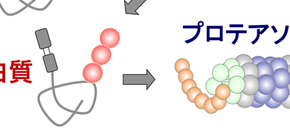
New hepatitis C virus mechanism elucidated
A step toward the development of new hepatitis C drugs
A group of researchers led by Assistant Professor OKAMOTO Toru and Professor MATSUURA Yoshiharu of the Research Institute for Microbial Diseases, Osaka University identified a new drug target capable of suppressing the propagation of the hepatitis C virus (HCV), improving HCV pathologic conditions, and discovering its drug efficacy. HCV, a main cause of viral liver cancer, accounts for 70 percent of all liver cancers in Japan. There are about 200 million HCV-infected people in the world. Once infected, people develop fatty liver, hepatic fibrosis, and liver cancer.
Although the recent development of very effective drugs targeting HCV replicative enzymes has enabled the elimination of HCV, many challenges, including the emergence of resistant viruses and the development of liver cancer after eliminating viruses, still remained.
It was known that cleavage of the HCV core protein by the enzyme signal-peptide peptidase (SPP) of infected host cells played an important role in developing viral particle production and developing HCV pathologic conditions; however, details of this were not understood.
This group found a chemical compound to inhibit SPP activity from γ-Secretase inhibitors which were being developed as a drug for Alzheimer’s disease. From the study of these drugs and examination using gene editing technology, this group found that immature core proteins, which are not cleaved by SSP, were recognized by enzyme TRC8 and quickly degraded.
When this degradation process is inhibited, cellular damage is strongly induced by endoplasmic reticulum (ER) stress, so this degradation process is thought to serve as a quality control mechanism for new proteins.
This group also confirmed in model mice that when SPP activity was inhibited, HCV particle production was significantly reduced, improving HCV pathologic conditions such as insulin resistance and fatty liver.
This group’s study showed that SSP might serve as a novel drug target for chronic hepatitis C. Many γ-Secretase inhibitors developed by companies around the world inhibit SPP activity specifically, so the development of SPP inhibitors using γ-Secretase inhibitors as lead compounds is expected.
Furthermore, the ER’s protein quality control mechanism via SPP/TRC8 identified by this group is thought to be related to other diseases as well, so this mechanism will be used for developing drugs for treating a wide range of diseases.
Abstract
Hepatitis C virus (HCV) is a major causative agent of chronic liver diseases including steatosis, cirrhosis and hepatocellular carcinoma. Transgenic mice expressing HCV core protein (CoreTg) exhibit insulin-resistance, steatosis and finally develop hepatocellular carcinoma, suggesting that core protein plays crucial roles in pathogenesis of HCV. Signal peptide peptidase (SPP) is an intramembrane protease that participates in production of the mature core protein of HCV. Here we show that SPP inhibition reduces production of infectious HCV particles and pathogenesis. The immature core protein produced in SPP-knockout cells or by the treatment with an SPP inhibitor is quickly degraded by the ubiquitin-proteasome pathway. TRC8, an E3 ubiquitin ligase, was shown to participate in the degradation of the immature HCV core protein. Oral administration of the SPP inhibitor into CoreTg or one allele deletion of SPP gene ameliorates insulin-resistance and liver steatosis. Our finding suggests that SPP is a novel target for anti-HCV therapy.

Again, we confirm that CoreTgSPP;/- mice did not show insulin resistance, and steatosis.
This data suggested that 50% inhibition of SPP was sufficient for improvement of insulin resistance and steatosin in coreTg mice.
To learn more about this research, please view the full research report entitled " TRC8-dependent degradation of hepatitis C virus immature core protein regulates viral propagation and pathogenesis " at this page of the Nature Communications website.
Related link
